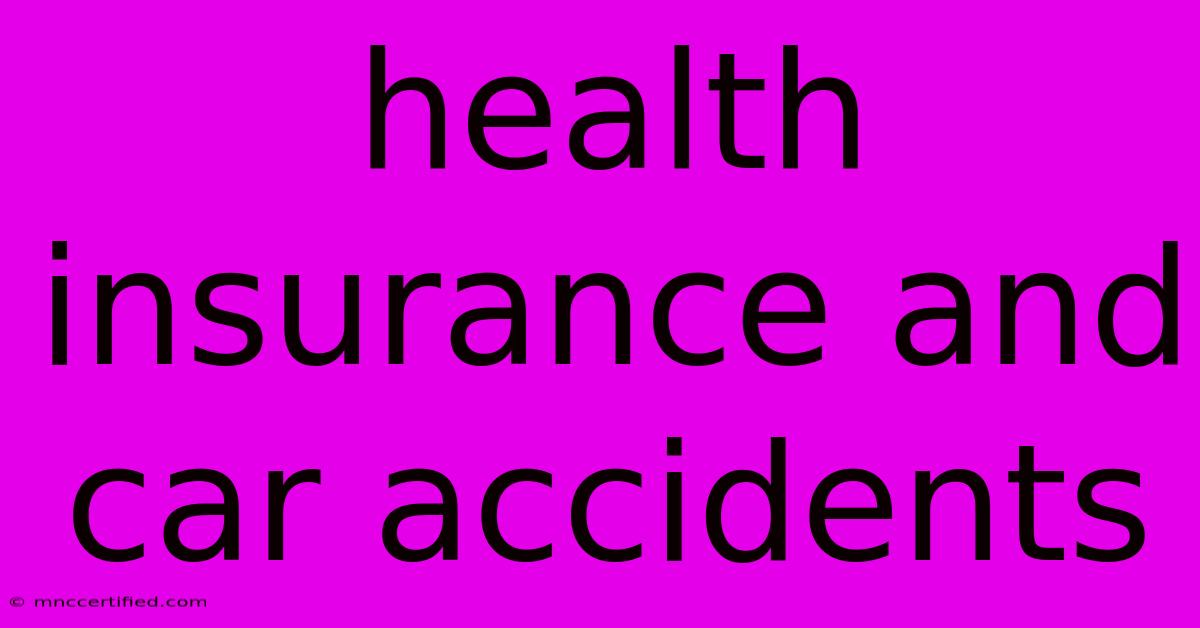Health Insurance And Car Accidents

Table of Contents
Health Insurance and Car Accidents: What You Need to Know
Car accidents are unfortunately a common occurrence, and when they happen, understanding your health insurance coverage is crucial. This article will break down how health insurance interacts with car accidents, covering everything from immediate treatment to long-term care. We'll also address important considerations regarding personal injury protection (PIP) and uninsured/underinsured motorist coverage.
Understanding Your Health Insurance Coverage After a Car Accident
After a car accident, your priority should be seeking medical attention. Your health insurance will likely cover many of the medical expenses incurred, but the specifics depend on your policy and the circumstances of the accident. Here's what you need to know:
Emergency Room Visits and Immediate Treatment:
Your health insurance will typically cover emergency room visits and immediate treatment for injuries sustained in a car accident. This includes things like:
- X-rays and other diagnostic imaging
- Surgery
- Hospital stays
- Medication
Important Note: Always inform the medical staff that your injuries are accident-related. This ensures proper documentation for insurance claims.
Follow-up Care and Rehabilitation:
Your health insurance will usually cover necessary follow-up care and rehabilitation, such as physical therapy, occupational therapy, and chiropractic care. However, pre-authorization may be required for certain treatments. Always check with your insurance provider before undergoing any significant medical procedures or extended treatment plans.
Long-Term Care:
If your injuries result in long-term care needs, such as ongoing physical therapy or home healthcare, your health insurance may cover some or all of these expenses. However, coverage can be limited, and you may need to explore other options like Medicaid or long-term care insurance. Understanding your policy limits is paramount.
The Role of Personal Injury Protection (PIP)
Many states require drivers to carry Personal Injury Protection (PIP) insurance. PIP coverage helps pay for your medical bills and lost wages, regardless of who caused the accident. This is especially helpful if you're injured in an accident caused by an uninsured driver or if you're unsure about fault.
How PIP Works:
PIP coverage typically pays for:
- Medical expenses
- Lost wages
- Rehabilitation costs
Key Difference from Health Insurance: PIP often has a specific coverage limit, meaning it might not cover all your medical expenses. It can act as a supplement to your health insurance, filling in the gaps where your health insurance falls short.
Uninsured/Underinsured Motorist Coverage
If you're involved in an accident with an uninsured or underinsured driver, your own uninsured/underinsured motorist (UM/UIM) coverage can help protect you. This coverage can pay for your medical bills, lost wages, and other expenses that the at-fault driver's insurance wouldn't cover. This is crucial protection in high-risk areas or when dealing with drivers who may not have adequate insurance.
Filing a Claim After a Car Accident
After a car accident, promptly report the accident to your insurance company and the police. Gather as much information as possible, including:
- Police report number
- Contact information for all involved parties and witnesses
- Photos and videos of the accident scene and your injuries
Provide your insurance company with all necessary documentation, including medical bills and records. Be prepared to answer their questions thoroughly and honestly.
Navigating the Insurance Process
The process of filing claims and dealing with insurance companies can be complex. If you’re having difficulty understanding your coverage or navigating the claims process, consider seeking assistance from:
- Your insurance provider: Contact your insurance company directly to clarify any questions or concerns about your coverage.
- A lawyer: If you have suffered significant injuries or are dealing with a complex legal situation, consulting a personal injury lawyer is highly recommended. They can help you understand your rights and protect your interests.
Conclusion: Proactive Planning is Key
Understanding your health insurance coverage and the roles of PIP and UM/UIM insurance is critical before a car accident occurs. Review your policy carefully, and don't hesitate to contact your insurance provider or a legal professional if you have any questions or require further clarification. Being prepared can significantly reduce stress and ensure you receive the necessary medical care and financial support after a car accident.

Thank you for visiting our website wich cover about Health Insurance And Car Accidents. We hope the information provided has been useful to you. Feel free to contact us if you have any questions or need further assistance. See you next time and dont miss to bookmark.
Featured Posts
-
Davina Mc Call Recovering Post Surgery
Nov 16, 2024
-
Certainty Life Insurance Word Hike
Nov 16, 2024
-
Sublimity Insurance Company Oregon
Nov 16, 2024
-
The A Silo Season 2 Premiere Review
Nov 16, 2024
-
Bbc Cuts Short Girls Alouds Sarah Harding Tribute
Nov 16, 2024